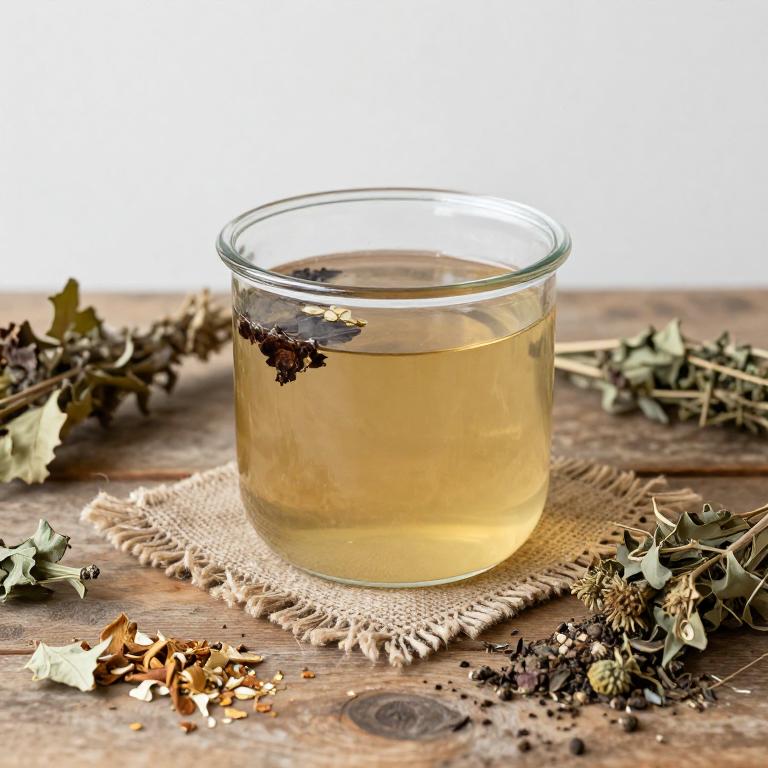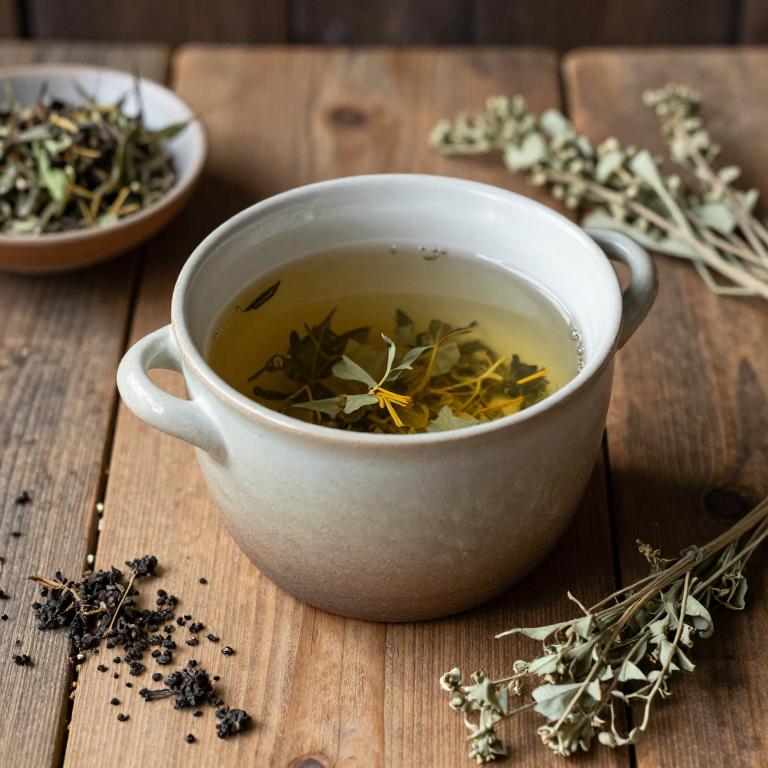10 Best Herbal Decoctions For Upper Abdominal Pain

Herbal decoctions have been traditionally used to alleviate upper abdominal pain by addressing underlying digestive issues such as indigestion, gastritis, or bloating.
Common herbs like ginger, peppermint, and fennel are often included in these decoctions due to their soothing and carminative properties. Preparing a decoction involves simmering the herbs in water for an extended period to extract their active compounds, which can then be consumed as a tea or liquid. These natural remedies are generally considered safe for many individuals, though they should not replace professional medical advice for persistent or severe pain.
It is important to consult a healthcare provider before using herbal decoctions, especially if there are pre-existing health conditions or if taking other medications.
Table of Contents
- 1. Cumin (Cuminum cyminum)
- 2. Ginger (Zingiber officinale)
- 3. Fennel (Foeniculum vulgare)
- 4. Turmeric (Curcuma longa)
- 5. Thistle (Silybum marianum)
- 6. Licorice (Glycyrrhiza glabra)
- 7. Peppermint (Mentha piperita)
- 8. Black pepper (Piper nigrum)
- 9. Dog rose (Rosa canina)
- 10. Black cumin (Nigella sativa)
1. Cumin (Cuminum cyminum)

Cuminum cyminum, commonly known as cumin, has been traditionally used in herbal medicine for its potential therapeutic effects on digestive ailments, including upper abdominal pain.
Herbal decoctions made from cumin seeds are often prepared by boiling the dried seeds in water to extract their essential oils and active compounds. These decoctions are believed to aid in reducing inflammation, improving digestion, and alleviating discomfort in the upper abdomen. The essential oils in cumin, such as cuminaldehyde and limonene, may contribute to its antispasmodic and carminative properties.
However, while some studies suggest possible benefits, more clinical research is needed to fully establish the efficacy and safety of cumin decoctions for treating upper abdominal pain.
2. Ginger (Zingiber officinale)

Zingiber officinale, commonly known as ginger, has been traditionally used in herbal medicine for its anti-inflammatory and analgesic properties.
Herbal decoctions made from fresh or dried ginger root are often prepared by simmering the rhizome in water to extract its active compounds, such as gingerols and shogaols. These decoctions are believed to help alleviate upper abdominal pain by reducing inflammation, soothing the gastrointestinal tract, and improving digestion. Studies suggest that ginger may inhibit the release of prostaglandins, which are associated with pain and inflammation in the stomach lining.
As a result, ginger decoctions are frequently recommended as a natural remedy for conditions like gastritis, indigestion, and mild stomach discomfort.
3. Fennel (Foeniculum vulgare)

Foeniculum vulgare, commonly known as fennel, has been traditionally used in herbal medicine to alleviate upper abdominal pain, particularly associated with digestive issues such as bloating, indigestion, and gas.
A fennel herbal decoction is typically prepared by simmering the dried seeds in water for several minutes, allowing the active compounds, such as anethole and fenchone, to be extracted. These compounds possess antispasmodic and carminative properties that help relax the smooth muscles of the gastrointestinal tract, reducing cramping and discomfort. The decoction is often consumed after meals or before bedtime to support digestive function and ease persistent upper abdominal pain.
While generally considered safe, it is advisable to consult a healthcare professional before using fennel decoctions, especially for individuals with existing medical conditions or those taking medications.
4. Turmeric (Curcuma longa)

Curcuma longa, commonly known as turmeric, has been traditionally used in herbal medicine for its anti-inflammatory and analgesic properties.
Herbal decoctions made from Curcuma longa are often prepared by boiling the rhizomes in water to extract the active compounds, particularly curcumin. These decoctions may be used to alleviate upper abdominal pain, which can be associated with conditions such as gastritis, indigestion, or inflammation of the gastrointestinal tract. The anti-inflammatory effects of curcumin may help reduce irritation and pain in the upper abdomen.
However, it is important to consult a healthcare professional before using curcuma longa decoctions, especially if the pain is severe or persistent.
5. Thistle (Silybum marianum)

Silybum marianum, commonly known as milk thistle, has been traditionally used for its potential hepatoprotective properties, and its herbal decoctions are sometimes considered for upper abdominal pain, particularly when associated with liver or gallbladder conditions.
The active compound, silymarin, is believed to have antioxidant and anti-inflammatory effects that may support liver function and reduce irritation in the gastrointestinal tract. While some studies suggest that silybum marianum may alleviate symptoms related to liver dysfunction, its efficacy for general upper abdominal pain remains inconclusive. It is often used as a complementary therapy under the guidance of a healthcare provider, especially for individuals with chronic liver diseases.
However, more clinical research is needed to establish its safety and effectiveness for treating upper abdominal pain in a broader population.
6. Licorice (Glycyrrhiza glabra)

Glycyrrhiza glabra, commonly known as licorice root, has been traditionally used in herbal medicine for its anti-inflammatory and soothing properties.
Herbal decoctions made from Glycyrrhiza glabra are often employed to alleviate upper abdominal pain, particularly in conditions such as gastritis and peptic ulcers, due to its ability to protect the gastric mucosa. The active compounds in licorice root, including glycyrrhizin and flavonoids, contribute to its antacid and anti-inflammatory effects. However, prolonged use of licorice root decoctions may lead to side effects such as hypertension and electrolyte imbalances, necessitating careful monitoring.
Despite these considerations, glycyrrhiza glabra remains a valuable herbal remedy for managing upper abdominal discomfort when used under proper guidance.
7. Peppermint (Mentha piperita)

Mentha piperita, commonly known as peppermint, has been traditionally used in herbal medicine to alleviate upper abdominal pain, particularly related to conditions such as gastritis, indigestion, and irritable bowel syndrome.
Peppermint herbal decoctions are prepared by simmering the dried leaves in water, allowing the active compounds like menthol and menthone to be extracted. These compounds act as antispasmodics, helping to relax the smooth muscles of the gastrointestinal tract and reduce cramping. The cooling effect of peppermint can also soothe inflammation and irritation in the stomach lining.
However, while generally safe for short-term use, peppermint decoctions should be used cautiously in individuals with gastroesophageal reflux disease, as they may exacerbate symptoms.
8. Black pepper (Piper nigrum)

Piper nigrum, commonly known as black pepper, has been traditionally used in herbal medicine for its potential therapeutic effects on digestive ailments, including upper abdominal pain.
The active compound, piperine, is believed to enhance gastrointestinal motility and reduce inflammation, which may help alleviate discomfort in the upper abdomen. Herbal decoctions of black pepper are often prepared by simmering the dried fruit in water, allowing the active components to be extracted for consumption. These decoctions may provide relief from symptoms such as bloating, indigestion, and mild gastritis, though they should be used with caution and under medical supervision.
While anecdotal evidence supports its use, further clinical research is needed to fully understand its efficacy and safety for treating upper abdominal pain.
9. Dog rose (Rosa canina)

Rosa canina, commonly known as dog rose, has been traditionally used in herbal medicine for its anti-inflammatory and digestive properties.
Herbal decoctions made from the flowers and hips of Rosa canina are often prepared by simmering the dried parts in water to extract their active compounds. These decoctions may help alleviate upper abdominal pain by reducing inflammation in the gastrointestinal tract and promoting healthy digestion. The presence of antioxidants and flavonoids in Rosa canina contributes to its potential soothing effect on the stomach lining.
However, while some studies suggest its efficacy, it is important to consult a healthcare professional before using it as a treatment for persistent or severe abdominal pain.
10. Black cumin (Nigella sativa)

Nigella sativa, commonly known as black cumin, has been traditionally used in herbal medicine for its potential therapeutic properties.
Herbal decoctions made from the seeds of Nigella sativa are often prepared by boiling the seeds in water to extract their active compounds, such as thymoquinone, which may have anti-inflammatory and analgesic effects. These decoctions are sometimes used to alleviate upper abdominal pain, possibly due to their ability to reduce gastric inflammation and improve digestive function. However, while some anecdotal evidence and preliminary studies suggest benefits, more rigorous clinical trials are needed to confirm their efficacy and safety for this specific use.
As with any herbal remedy, it is advisable to consult a healthcare professional before using Nigella sativa decoctions, especially for individuals with pre-existing medical conditions or those taking other medications.